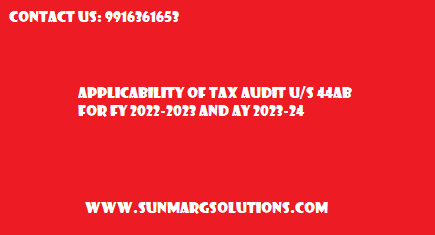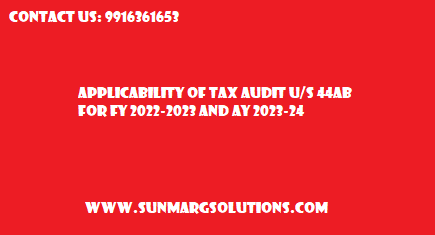Applicability of Tax Audit u/s 44AB for FY 2022-2023 and AY 2023-24
Income tax audit under Section 44AB is a crucial compliance requirement, distinct from statutory audit under the Companies Act. This article provides insights into the applicability, calculation of turnover, due dates, penalties, and related aspects of income tax audit for the financial year 2022-23.

Mandatory Tax Audit:
Income tax audit applies to all companies and LLPs whose turnover or gross receipts exceed prescribed thresholds. The thresholds for other business entities and professionals are aligned with those for companies. For businesses, a turnover exceeding Rs. 10 crore triggers the audit, while for professionals, gross receipts surpassing Rs. 50 lakhs necessitate an audit.
| Sr. No. | Category | Tax Audit Applicability | Conditions |
| 1 | Business | Yes | – Turnover > Rs. 10 Cr – Not opting for presumptive taxation – Cash transactions up to 5% of total gross receipts and payments |
| 2 | Business | No | Turnover < Rs. 10 Cr and Condition of 5% of Gross Receipts and Payment satisfied. |
| 3 | Business | Yes | – Turnover between Rs. 1 Cr and Rs. 10 Cr – Not opting for presumptive taxation – Cash transactions exceeding 5% of total gross receipts and payments |
| 4 | Business | No | Turnover < Rs. 2 Cr and opted for Section 44AD |
| 5 | Business | Yes | Carrying on business under specified sections with profits or gains lower than presumptive taxation limit |
| 6 | Profess. | Yes | – Turnover > Rs. 50 Lac – Not opted for presumptive taxation under 44ADA – Opted for 44ADA but claims profits below presumptive taxation limit |
| 7 | Profess. | No | Opted for presumptive taxation under 44ADA and declares profits within the prescribed limit |
Calculating Turnover for Tax Audit:
For tax audit applicability, turnover is a vital parameter. In this context, turnover refers to the total sales with necessary adjustments for goods returned, price adjustments, and trade discounts, rather than just the overall sales figure. Excluded from turnover calculations are transactions involving fixed assets, rental/interest income, advances from customers, cash and trade discounts, returned goods, and sale proceeds of investments like shares and securities.
Due Date and Penalty:
The due date for tax audit of FY 2022-23 is September 30, 2023. Failure to conduct tax audit by this date attracts penalties. The penalty is either 0.5% of sales/turnover/gross receipts or Rs. 1,50,000, whichever is lower.
Limit on Chartered Accountants:
Chartered Accountants (CAs) are the only professionals authorized to sign tax audit reports. A CA can conduct a maximum of 60 tax audits, which also applies individually to each partner in a partnership firm.
Accounts Audited Under Other Laws:
If accounts are audited under other laws (e.g., statutory audit under the Companies Act), a separate audit for income tax purposes isn’t required. Only an audit report compliant with income tax regulations needs to be filed.
Tax Audit Forms:
Assessees subject to tax audit must file relevant forms along with their income tax returns. The forms include:
- Form 3CA & Form 3CD: For entities audited under other laws.
- Form 3CB & Form 3CD: For entities exclusively audited for income tax compliance.
- Form 3CE: For non-residents and foreign companies receiving royalty/fees for technical services.
Tax Audit Report Revision and Penalty Waiver:
Tax audit reports can be revised multiple times through the income tax portal. Penalty waivers are possible if reasonable causes are provided for non-submission of tax audit reports by the deadline.
In conclusion, understanding income tax audit under Section 44AB is vital for businesses and professionals to ensure compliance with the law and avoid penalties.
Disclaimer:
The information provided in the above article is intended for general informational purposes only and should not be construed as professional advice. The article is based on the latest amendment applicable to FY 2022-23 and is subject to change based on updates to tax laws, regulations, and guidelines. Readers are advised to consult with qualified tax professionals, accountants, or legal advisors to obtain accurate and up-to-date information specific to their individual circumstances. While every effort has been made to ensure the accuracy of the information presented, no responsibility or liability is assumed for any errors or omissions in the content. Tax regulations and laws can be complex and subject to interpretation, and the application of these rules may vary based on individual circumstances. The author and publisher of this article disclaim any liability for actions taken or decisions made based on the information provided herein. Readers are encouraged to independently verify the accuracy and applicability of the information provided before making any financial or legal decisions.

